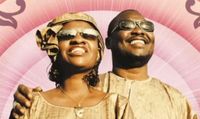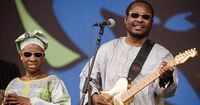Amadou Bagayoko, a Malian guitarist and composer, known for his partnership with his wife, singer Mariam Doumbia, in the internationally acclaimed duo Amadou & Mariam, passed away on April 4, 2025, at the age of 70 in Bamako, Mali. His death was confirmed by members of the Malian government, although no specific cause was disclosed. Bagayoko's passing has left a profound impact on the music community, with thousands attending his funeral in Bamako on April 6.
The couple, who famously coined the term "Afro-rock" to describe their unique blend of West African sounds with rock and blues influences, achieved global fame with their breakthrough album, "Dimanche à Bamako," released in 2005. This album not only sold over half a million copies worldwide but also won numerous accolades, including the Victoire de la Musique and the BBC Radio World Music Award in 2005. The album's success catapulted them into the international music scene, leading to collaborations with notable artists such as Damon Albarn of Blur and performances at major festivals like Glastonbury and Coachella.
Born on October 24, 1954, in Bamako, Bagayoko lost his sight at the age of 15 due to a congenital cataract. He later attended Mali's Institute for the Young Blind, where he met Doumbia, who had also lost her vision at a young age. Their shared experiences of blindness forged a deep connection, and they eventually formed their band, initially named Mali's Blind Couple, in 1980. The duo later relocated to Ivory Coast in 1986, seeking better opportunities in a music industry that was still developing in Mali.
Throughout their career, Amadou & Mariam's music evolved, incorporating various musical styles while maintaining a distinct African essence. Bagayoko described their sound as "part blues, part rock, part African," emphasizing the rhythm and cultural fusion that characterized their work. Their lyrics often touched on themes of love, solidarity, and social issues, making their music relatable to a broad audience.
In a heartfelt tribute, Doumbia recounted her husband's final moments, stating, "I took his hand and tried to make some movements with it, but it didn't move. I said, 'Amadou, don't do this, speak to Mariam... but he didn't speak any more.'" This poignant reflection highlights the deep bond they shared both personally and professionally.
Tributes poured in from fellow musicians and artists following Bagayoko's death. Franco-Spanish musician Manu Chao, who produced "Dimanche à Bamako," expressed his sorrow on Instagram, stating, "We will always be together... Wherever you go. Mariam, Sam, the whole family, your pain is my pain. I love you." Young Malian singer Sidiki Diabate lamented the loss, calling it "another immense loss for Malian music," while Youssou N'Dour praised the duo as "the ambassadors of African music almost everywhere in the world."
Bagayoko's final performance took place at the closing ceremony of the Paris 2024 Paralympic Games, a testament to his enduring legacy and commitment to music. Despite the challenges he faced due to his blindness, Bagayoko's talent and passion for music resonated with audiences worldwide. He and Doumbia had been scheduled for a European tour in May and June of 2025, underscoring their ongoing relevance in the music scene.
Amadou & Mariam's influence extended beyond music; they served as role models for many, demonstrating that barriers could be overcome through dedication and creativity. Their story, from humble beginnings in Mali to international stardom, inspired countless fans and musicians alike. Bagayoko's legacy will continue through his music, which remains a celebration of resilience, love, and cultural pride.
As the world remembers Amadou Bagayoko, his contributions to music and the joy he brought to many will not be forgotten. The couple's journey together, marked by their shared struggles and triumphs, is a powerful reminder of the unifying power of music.








